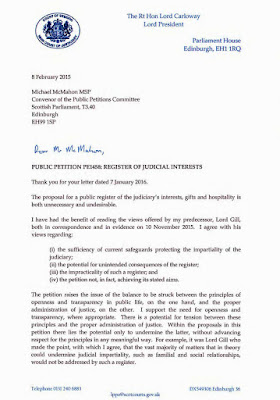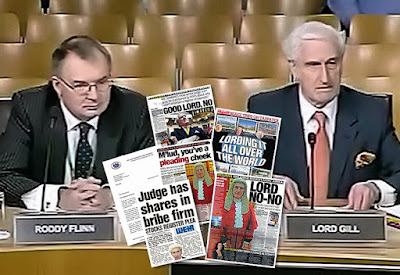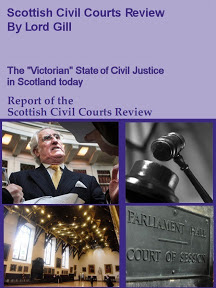 Lord Carloway – opposes judicial interests register. SCOTLAND’S newly appointed top judge – Lord President Lord Carloway - has attacked proposals before the Scottish Parliament calling for judges to be required to declare their financial interests and links to big business as called for in Petition PE1458: Register of Interests for members of Scotland's judiciary.
Lord Carloway – opposes judicial interests register. SCOTLAND’S newly appointed top judge – Lord President Lord Carloway - has attacked proposals before the Scottish Parliament calling for judges to be required to declare their financial interests and links to big business as called for in Petition PE1458: Register of Interests for members of Scotland's judiciary.
The widely backed proposals - debated at the Scottish Parliament on 9 October 2014 - call for the creation of a publicly available register of judicial interests containing information on judges backgrounds, their personal wealth, undeclared earnings, business & family connections inside & outside of the legal profession, offshore investments, hospitality, details on recusals and other information routinely lodged in registers of interest across all walks of public life in the UK and around the world
However, Scotland’s latest top judge – on a salary of £220,655 a year - has declared his opposition to calls for a register of judges’ interests, with Lord Carloway claiming - the judiciary must remain exempt from the same transparency rules which apply to all other branches of Government, public bodies and the Scottish Parliament.
Writing to Michael McMahon MSP, convener of the Scottish Parliament’s Public Petitions Committee, Lord Carloway said: “It is of great constitutional importance that the judiciary remain functionally distinct from both elected representatives, who make the law, and the Government, who promote changes to the law and take executive decisions in areas involving wide discretionary powers covering many areas of economic interest.
And, the top judge – who recently published a speech on making Scotland’s courts 'fit for the 21st Century' – claimed justice could grind to a halt in a constitutional calamity if judges were forced to declare their vast wealth, property owning interests, professional links and other financial affairs – just like politicians, members of public bodies, local councillors are required to reveal.
Lord Carloway (real name: Colin Sutherland) told MSPs: “The proper administration of justice could be inhibited by the disclosure of the judiciary's otherwise confidential financial arrangements. In that connection, there is the possibility that an individual judge may be the subject of misconceived criticism, deriving from the disclosure of personal financial information, where those interests are tangential and de minimis.”
The move by Scotland’s latest Lord President to undermine the Scottish Parliament’s efforts to increase judicial transparency follows a bitter three year campaign against the petition - led by Carloway’s former boss – Lord Brian Gill – which culminated in an ‘aggressive’ evidence session with the former top judge at Holyrood in November 2015.
Responding to Lord Carloway’s letter, the petitioner told the Committee: “Lord Carloway presents the same view of his predecessor Lord Gill in that a register of interests for the judiciary is unnecessary or undesirable. Similarly, as Lord Gill has already inferred, Lord Carloway speaks of constitutional problems if the judges are asked to declare their interests.”
“In reality, there are no constitutional issues created by this petition, nor is there an impediment to the creation of a register of judicial interests. Such a register already exists for the Scottish Court Service and Tribunals Board, of which Lord Carloway and others declare their interests.”
“As members of the Petitions Committee have already discussed, it would be no great effort to expand the already existing register to include the entire judiciary. The Committee is also well aware other jurisdictions have implemented registers of judicial interests, without difficulty or an end to justice as we know it.”
“It is not enough to say, as the Lord President suggests, the judiciary should be excluded from the public's expectation of transparency, simply because the judiciary say so upon their own rules.”
“Thankfully, there is a general realisation, and acceptance, that registers of interest in public life are required, promote transparency and assist in the process of good government and detection of vested interests where they should not be.”
Lord Carloway added judges were unable to speak out in public or defend themselves against criticism – despite a series of recent headlines where judges have embarked on highly publicised criticisms of Police Scotland, the Crown Office, the media and other public bodies.
Responding to the Lord President's claims of a judiciary under a vow of silence - the petitioner told the Committee: “Lord Carloway suggests in his letter judges are unable to speak out in public. Not so. The media have covered numerous examples where members of Scotland's judiciary have spoken out in public, on government policy, reforms in the courts, cuts to legal aid, or more recently where senior members of the judiciary have become embroiled in public arguments with the Police and Prosecutors on evidence presentation in court.”
The petitioner provided MSPs with examples of judicial public comments, stating: “On the same day the media reported that the Scottish Government announced a moratorium on Shale Gas Fracking, the previous Lord President Lord Gill spoke out, declaring "Our resources of energy may be increased by the retrieval of shale gas, if that should be allowed. It seems to me therefore that the opportunity that our natural resources present should be served by the court system."
“The current Lord President himself was recently reported in the media to have availed himself of opportunities to speak out against certain interests he appeared to believe contributed to blocking Scottish Government policies such as the removal of corroboration - a move rejected by the Scottish Parliament's Justice Committee.”
“Transparency underpins our modern democracy, and should underpin our courts and judiciary in equal measure. A register of judicial interests enhances transparency, and is both in the public's interest, and that of the judiciary.”
The petitioner concluded his response by asking members of the Public Petitions Committee to call the Lord President to give evidence and to contact Law Professor Alan Paterson of the University of Strathclyde – who has published a book and material on judicial interests.
 Letter from Lord Carloway to Michael McMahon MSP, Convener, Public Petitions Committee.
Letter from Lord Carloway to Michael McMahon MSP, Convener, Public Petitions Committee.
Lord Carloway: The proposal for a public register of the judiciary's interests, gifts and hospitality is both unnecessary and undesirable.
I have had the benefit of reading the views offered by my predecessor, Lord Gill, both in correspondence and in evidence on 10 November 2015. I agree with his views regarding:
(i) the sufficiency of current safeguards protecting the impartiality of the judiciary;
(ii) the potential for unintended consequences of the register;
(iii) the impracticality of such a register; and
(iv) the petition not, in fact, achieving its stated aims.
The petition raises the issue of the balance to be struck between the principles of openness and transparency in public life, on the one hand, and the proper administration of justice, on the other. I support the need for openness and transparency, where appropriate. There is a potential for tension between these principles and the proper administration of justice. Within the proposals in this petition there lies the potential only to undermine the latter, without advancing respect for the principles in any meaningful way. For example, it was Lord Gill who made the point, with which I agree, that the vast majority of matters that in theory could undermine judicial impartiality, such as familial and social relationships, would not be addressed by such a register.
The proper administration of justice could be inhibited by the disclosure of the judiciary's otherwise confidential financial arrangements. In that connection, there is the possibility that an individual judge may be the subject of misconceived criticism, deriving from the disclosure of personal financial information, where those interests are tangential and de minimis. It is inappropriate for judges to make public comment beyond their judicial opinions in relation to individual cases. Therefore, unlike an elected representative or a member of the Government, a judge enjoys no right of reply. Judges thus have no scope to remedy unjustified reputational and professional damage by explaining their decisions or responding to criticism.
The appropriate safeguard with regard to the judiciary is not a register of interests, but the obligation to decline jurisdiction in a case ("recuse himself/herself") where he or she has any real or perceptible conflict of interest, whatever the nature of that conflict. In that regard, in the interests of openness and transparency, all instances of (and reasons for) recusals are published on the judiciary's website.
It is of great constitutional importance that the judiciary remain functionally distinct from both elected representatives, who make the law, and the Government, who promote changes to the law and take executive decisions in areas involving wide discretionary powers covering many areas of economic interest. The danger that representatives and the Government could be influenced by personal interest is ameliorated by the relevant disclosure requirements incumbent upon them. The judiciary's function is not that of law-making nor is it equivalent to any kind of executive power. The same considerations do not apply.
Lord Gill said that judges, "by their imaginative development of the law, [...] improve and extend the law, explaining it in their judgments". I echo this characterisation, but it is not reasonable to suggest that a judge, through the means Lord Gill explained, would be able to dispense jurisprudence over a period of time that would advantage a particular financial interest which he or she had.
I hope that this assists the Committee.
Amid calls for Lord Carloway to be called to give evidence and take questions on his opposition to judicial transparency, the Scottish Parliament’s Public Petitions Committee will consider the petition again next week, on Tuesday 23 February 2016.
In a previous session of the Public Petitions Committee MSPs took evidence from the current Judicial Complaints Reviewer (JCR) – Gillian Thompson – who said: “I do not see that there is a reasonable argument to be made against people who are in public service—I might go further and say, in particular, people who are paid by the public pound—providing information, within reason, about their other activities.”
MSP Jackson Carlaw (Scottish Conservative, West Scotland) told colleagues during the same hearing: “The clerk has advised me that it is not competent for the committee to initiate a bill of its own. Of course, it is open to any member of the Parliament to do so, in this session or the next.”
“As Ms Thompson has said, there seems to be a clear public interest in the issue, which has found expression. In the absence of a more substantive argument than the impression that it is not something that people want, the committee should be reluctant to allow the petition to run into the sand. We should do all that we can to sustain it and pursue its objectives for as long as we feel able to do so.”
Scotland’s first Judicial Complaints Reviewer, Moi Ali, also backed the petition.
During an evidence session held at Holyrood in September 2013 - Moi Ali provided a first hand, honest and highly detailed account of the workings of Scotland’s judiciary and lack of judicial transparency & accountability.
Ms Ali wrote a further letter to MSPs while she held the post of Judicial Complaints Reviewer – writing of the “incredibly powerful” nature of the judiciary and why a register of judicial interests would help judicial transparency and public confidence in the justice system.
Moi Ali said: “I write not from the viewpoint of the judiciary, who have a vested interest in this issue. I write from the perspective of the Scottish public. I write not on behalf of those who hand down justice, but those who are on the receiving end. It is important that their voice is heard. They have a right to know that justice is being done, an essential component of which is that it is seen to be done. A register of interests is a tangible way of showing that justice is being done.”
“Given the position of power held by the judiciary, it is essential not only that they have absolute integrity but crucially, that they are seen to have absolute integrity. Again, a register of interests is a way of demonstrating that a judicial office holder is impartial and has no vested interest in a case –financially, through family connections, club/society membership or in any other way. Conversely, the refusal to institute a register of interests creates suspicion that in turn undermines judicial credibility. So once more, a register of interests is good for the judiciary and good for the public.”
Previous articles on the lack of transparency within Scotland’s judiciary, investigations by Diary of Injustice including reports from the media, and video footage of debates at the Scottish Parliament’s Public Petitions Committee can be found here : A Register of Interests for Scotland's Judiciary













